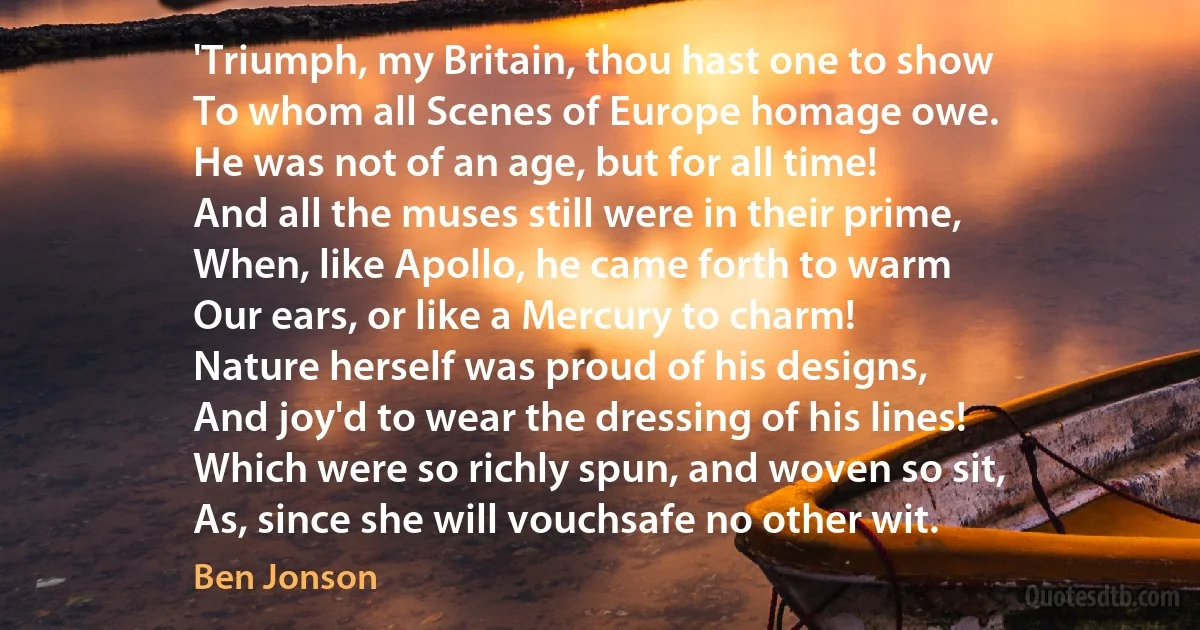Wear Quotes - page 99
Immediately after you get into that stage of relaxation, think of a situation before you were ten years old. Let's just say there's somebody sick in your house, and you go into your memory to see what happened. When I do that, I remember the kind of shoes I was wearing. You remember your favorite shirt, your favorite dresses and things that you wore and how it felt. That someone was sick in your house absolutely connects you to whatever relationships you had. You don't really "think" about it. In this way, what comes out is really true.

Milcha Sanchez-Scott
Women who cover their heads in this country must feel comfortable going outside their homes. Moms who wear cover must be not intimidated in America; that's not the America I know. That's not the America I value. I've been told that some fear to leave; some don't want to go shopping for their families. Some don't want to go about their ordinary daily routines because, by wearing cover, they're afraid they'll be intimidated. That should not and that will not stand in America. Those who feel like they can intimidate our fellow citizens to take out their anger don't represent the best of America, they represent the worst of humankind, and they should be ashamed of that kind of behavior.

George W. Bush
When we buy new clothes not to keep ourselves warm but to look "well-dressed" we are not providing for any important need. We would not be sacrificing anything significant if we were to continue to wear our old clothes, and give the money to famine relief. By doing so, we would be preventing another person from starving. It follows from what I have said earlier that we ought to give money away, rather than spend it on clothes which we do not need to keep us warm. To do so is not charitable, or generous. Nor is it the kind of act which philosophers and theologians have called "supererogatory" - an act which it would be good to do, but not wrong not to do. On the contrary, we ought to give the money away, and it is wrong not to do so.

Peter Singer
Stewart: [To Tucker Carlson] How old are you?
Carlson: Thirty-five.
Stewart: And you wear a bow tie. ... So this is theater. ... Now, listen, I'm not suggesting that you're not a smart guy, because those are not easy to tie. ... But the thing is that this-you're doing theater, when you should be doing debate, which would be great. ... It's not honest. What you do is not honest. What you do is partisan hackery.

Jon Stewart
It's said that Chaplin wanted you to like him, but Keaton didn't care. I think he cared, but was too proud to ask. His films avoid the pathos and sentiment of the Chaplin pictures, and usually feature a jaunty young man who sees an objective and goes for it in the face of the most daunting obstacles. Buster survives tornados, waterfalls, avalanches of boulders, and falls from great heights, and never pauses to take a bow: He has his eye on his goal. And his movies, seen as a group, are like a sustained act of optimism in the face of adversity; surprising, how without asking, he earns our admiration and tenderness.
Because he was funny, because he wore a porkpie hat, Keaton's physical skills are often undervalued ... no silent star did more dangerous stunts than Buster Keaton. Instead of using doubles, he himself doubled for his actors, doing their stunts as well as his own.

Roger Ebert
Moreover, pressure was brought to bear upon other countries to conform to the embargo, and goods destined for Cuba were sabotaged: machinery damaged, chemicals added to lubricating fluids to cause rapid wear on diesel engines, a manufacturer in West Germany paid to produce ball-bearings off-center, another to do the same with balanced wheel gears-"You're talking about big money," said a CIA officer involved in the sabotage efforts, "when you ask a manufacturer to go along with you on that kind of project because he has to reset his whole mold. And he is probably going to worry about the effect on future business. You might have to pay him several hundred thousand dollars or more."

William Blum
Being black and gay, having dreadlocks, having a certain kind of swag, and dressing the way I do...‘That's dope, you're cool.' I don't feel validated by that. . . . I don't want to be White. I don't want to be straight. I don't want to blend in. . . . I try to wear queer designers who happen to be brown and makin' shit.

Lena Waithe
"This is your earpiece. I will give you exactly one more chance to wear it. If you remove it from your ear again, I'll have you fitted with this." He holds up some sort of metal headgear that I instantly name the head shackle. "It's an alternative audio unit that locks around your skull and under your chin until it's opened with a key. And I'll have the only key. If for some reason you're clever enough to disable it,"-Haymitch dumps the head shackle on the bed and whips out a tiny silver chip-"I'll authorize them to surgically implant this transmitter into your ear so that I may speak to you twenty-four hours a day."
Haymitch in my head full-time. Horrifying. "I'll keep the earpiece in," I mutter.

Suzanne Collins
A man won't steal, ordinarily, unless that which he steals is something he cannot as easily get without stealing; in liberty the cost of stealing would involve greater difficulties than producing, and consequently he would not be apt to steal. But suppose a man steals. Today you go to a representative of that power which has robbed you of the earth, of the right of free contract of the means of exchange, taxes you for everything you eat or wear (the meanest form of robbery), - you go to him for redress from a thief!

Voltairine de Cleyre
Who thinks a dog is impure or obscene because its body is not covered with suffocating and annoying clothes? What would you think of the meanness of a man who would put a skirt upon his, horse and compel it to walk or run with such a thing impeding its limbs? Why, the "Society for the Prevention of Cruelty to Animals" would arrest him, take the beast from him, and he would be sent to a lunatic asylum for treatment on the score of an impure mind. And yet, gentlemen, you expect your wives, the creatures you say you respect and love, to wear the longest skirts and the highest necked clothing, in order to conceal the obscene human body. There is no society for the prevention of cruelty to women.

Voltairine de Cleyre
As the body is clad in the cloth, and the flesh in the skin, and the bones in the flesh, and the heart in the whole, so are we, soul and body, clad in the Goodness of God, and enclosed. Yea, and more homely: for all these may waste and wear away, but the Goodness of God is ever whole; and more near to us, without any likeness; for truly our Lover desireth that our soul cleave to Him with all its might, and that we be evermore cleaving to His Goodness. For of all things that heart may think, this pleaseth most God, and soonest speedeth.

Julian of Norwich
But Björk wore the best dress ever to the Oscars, ever. She wore a swan. And I'm not talking about a dress with white feathers on it. Oh, no. She rocked the whole bird. The beak was up here and shit. And she accessorized it with an egg -- what else you gon' wear with your bird?! And all of the fashion magazines said she was the worst dressed, but when they say you're the worst, that means you're the best.

Margaret Cho
Isolated here in the North, planted long ago by a Roman pilgrim, a chestnut grew, strong and solitary, by the colonnade of rounded double arches at the entrance to the cloister of Mariabronn: a noble, vigorous tree, the sweep of its foliage drooping tenderly, facing the winds in bold and quiet assurance; so tardy in spring that when all glowed green around it and even the cloister nut trees wore their russet, it awaited the shortest nights to thrust forth, through little tufts of leaves, the dim exotic rays of its blossom, and in October, after wine and harvests had long been gathered, let drop the prickly fruits from its yellowing crown... The lovely tree, aloof and tender, shadowed the entrance to the cloister, a delicate, shuddering guest from a warmer clime, secretly akin to the slender double columns of the gateway, the pillars and mouldings of the window arches, loved by all Latins and Italians, gaped at, as a stranger, by the inhabitants. Ch. I.

Hermann Hesse
'I have a relative who is in a mental hospital. He thinks he is Christ. Well, that's groovy. I am Christ also. But he doesn't think I am Christ. He thinks he is Christ. Because it happened to him and he took his ego with him. So he says: I'm special. And when I say to him: Sure man you're Christ. And I'm Christ too. He says: you don't understand. And when he's out he steals cars and things like that because he needs them because he's Christ and that's all right. So they lock him up. He says: I don't know ... me ... I'm a responsible member of society. I go to church. Me they put in a mental hospital. You're free. You've got a beard. You wear a dress ... you ...
Sure. Because as far as I'm concerned we are all God.
That's the difference.
If you really think another guy is God he doesn't lock you up...Funny about that.

Ram Dass
For years the folks back home kept on reelecting incompetents. They elected them because they liked the way they snapped their suspenders, not knowing that they never wore suspenders except when they were out electioneering. Or they elected them because they could hit a spittoon, nine times out of ten, at fifteen paces. Or maybe only because these good people back home always voted a straight ticket, no matter who was on it-the way their pappy and grandpappy always did.

Clifford D. Simak



